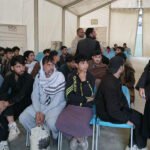The (IEA) has rejected claims made by Pakistan’s representative to the UN Security Council, Munir Akram, that Afghanistan is an ISIS (Daesh) “recruitment center”.
According to a statement issued by the foreign ministry, the IEA said the claims were unfounded and accused Pakistan of trying to shift focus away from its own internal issues.
The ministry reiterated that since the IEA’s return to power significant strides have been made to eradicate Daesh and other extremist groups in Afghanistan.
The foreign ministry stated that Pakistan is using these allegations as a distraction from its own instability. The ministry urged the international community to recognize the progress made in Afghanistan and to refrain from placing blame on the country.
This comes after Monday’s UN Security Council meeting where the threat of Daesh was discussed. The UN’s Under-Secretary-General for Counter-Terrorism, Vladimir Voronkov, said ISIS-K in Afghanistan (Daesh) “supporters plotted attacks in Europe and were actively seeking to recruit individuals from Central Asian States”.
Voronkov provided details on the global terrorism landscape during the past six months, and said “in Afghanistan, ISIL-Khorasan (Daesh) continued to pose a significant threat”.
Russia’s Ambassador to the United Nations also raised the issue of ISIS-K in Afghanistan and said the “access terrorist groups like ISIS have to leftover American weapons in Afghanistan” was concerning.
Afghanistan meanwhile does not have an Islamic Emirate representative at the UN and has repeatedly called for their seat to be handed over to them, stating any discussions on or including Afghanistan were meaningless without the IEA’s participation.
The Islamic Emirate has also repeatedly rejected claims of Daesh being active in Afghanistan and have said that the group has been eradicated in the country.
On the subject of US weapons in the country, the IEA has described such concerns as baseless and repeatedly stated that all US weapons and military equipment left behind are secured by the government, with no group or individual having access to them.













